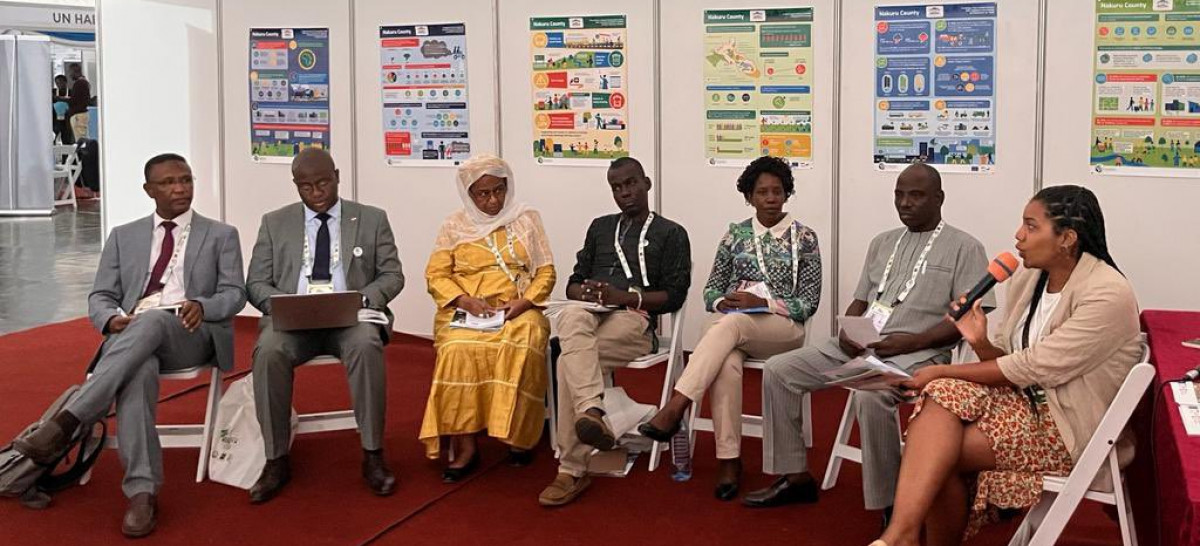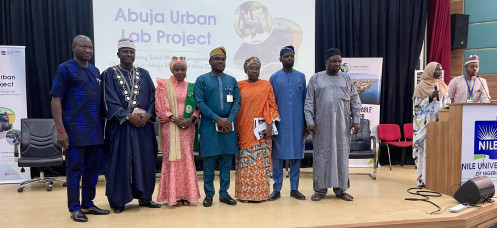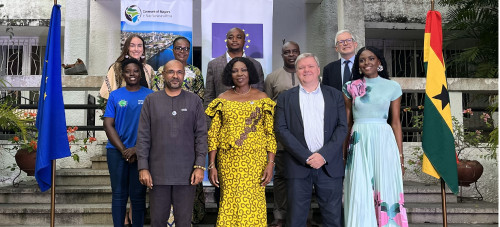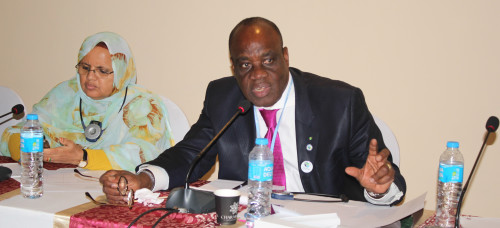Frontrunner cities from across Africa gather to share climate and energy planning insights
Published: 6 Jun 2022

Leaders and technical experts from six local governments discussed their climate action plans during a CoM SSA session at Africities. These cities have already completed, or are near completing, robust Sustainable Energy Access and Climate Action Plans and are motivated to implement on-the-ground change.
The Africities Summit 9 held in Kisumu, Kenya, was the first time in more than two years that a significant number of urban climate champions were able to meet in person. It was a chance to deliberate – deeply and at length – the climate change impacts their cities are already experiencing and ways to support sustainable, low carbon urbanisation while providing citizens with access to reliable and affordable energy.
One particular session gathering over 50 participants, focused on how climate action planning can lead to this shared future. Panellists from the cities of Abuja, Bobo-Dioulasso, Garoua, Nakuru, Nouakchott, and a representative from Togo, shared their experiences and raised awareness of the value of drafting, detailing, and validating a climate action plan as a necessary step to every city to assume its responsibilities in the fight against climate change. With representation from West, North and East Africa and giving a platform to cities that have either completed their SEACAPs or are very near to doing so, it is not surprising that the session was full to the brim and alive with meaningful and interactive discussion.
Climate change is unequally affecting urban communities, but thoughtful planning can lead to inclusive action
Abuja Municipal Area Council (AMAC), which is becoming increasingly dense since it was named Nigeria’s capital, is experiencing intense heatwaves and torrential rains. These and other climate hazards, as well as the fuel people currently use for cooking, are sending this rapidly expanding city on an unsustainable path.
“The global issues of climate change are also affecting local governments, where the impacts are already felt by these communities. We need to make sure people can live well in urban environments. Rains, strong wind, heatwaves and floods are causing serious hazards to some of the communities. Cutting trees is a critical issue and using charcoal as a source of energy is causing the population to contract respiratory diseases,” said Mr. Andrew Gaza, Head of Department, Works, AMAC.
AMAC is in the last stages of developing its SEACAP, which means the municipality is already aware of the challenges it will face if it continues on its current development path. The Council will soon host a validation workshop to finalise the actions the city is planning to take to set it on a new course.
“Some of the key findings involve our communities. The nature of the city is such that there is the metropolitan city, the sub-urban communities and the rural areas, and we need actions in the three of them. We also need a legal framework that enables us to reach the people since, as a local government, some of the policies fall at the national or regional level”, Mr. Gaza concluded.
The importance of involving many stakeholders when planning for climate action
The next and more difficult step once having a climate action plan is to translate it into practical measures. Processes of sensitization, communication and participation are essential for this implementing phase. To achieve the climate plan objectives, it is crucial to involve all stakeholders: public and private entities, associations and citizens.
Bobo-Dioulasso in Burkina Faso made sure to closely follow the development of its SEACAP and also involved as many relevant stakeholders as possible to increases buy-in for implementing the actions the city prioritised.
“When it comes to implementation, the municipality wanted to be strongly involved in each step of the process in order to own its climate plan. We made the process very participatory and inclusive and that is why lots of stakeholders have been involved from the start. We also focused on how to communicate to different audiences about the actions,” explained Hamidou Baguian, Director of Environment, Bobo-Dioulasso.
In Nakuru County, the urban leaders also involved communities in the data collection process to ensure they understand the reality on the ground. “In order to take climate action, data coming directly from the people mostly affected by the effects of climate change is needed,” said Grace Karanja, Director Environment, Energy & Natural Resources, County Government of Nakuru.
In Garoua, which consists of four municipalities (the Urban Community and Garoua I, II and III), these entities came together to create the first intercommunal climate action plan in Cameroon, again highlighting the importance of working together to set targets and actions that are both ambitious and achievable. Garoua’s SEACAP was launched in April 2022. Read more here.
“It has been a long process, but thanks to the support of GIZ, ICLEI Africa and Help Community, after two years of doing inquiries, asking the national services, the local population and traditional leaders, the plan is very well founded,” explained Ms. Abdou Asmahou, Representative for the mayor of the Urban Community of Garoua.
La ville de #Garoua a lancé le premier plan climat inter-communale au #Cameroun ???????? Ce document sera la feuille de route pour favoriser un développement à faibles émissions, s'adapter au #ChangementClimatique & fournir de l'énergie verte aux habitants????Voici la vidéo!???? pic.twitter.com/tKQMT5VZgJ
— Covenant of Mayors in Sub-Saharan Africa (@CoMOSSAfrica) April 14, 2022
From planning to implementation
All cities participating in the technical session are insistent that their SEACAPs will not become mere documents filed away.
According to Mr. Emile Atigaku, Director of the NGO PADIE, “it is clear that local governments want to get familiar with the tools needed to develop deep partnerships, particularly when it comes to sectors such as waste or energy. All CoM SSA signatories in Togo have expressed their desire to reinforce their capacities so that they can mobilize resources to develop and implement climate projects on their own”.
“Thanks to the SEACAP, all sectors have defined actions that they can implement within their sphere of action. Some of the actions have already started, like a programme encouraging people to use clean energy technologies,” said Ms. Karanja from Nakuru County.
Ms. Ashmahou highlighted an important consideration for implementing these actions. “Each municipality has its own development plan, but since these municipalities cannot finance on their own implementation, the mobilisation of resources is needed, e.g. to implement a public transport system in the city. This needs partners at the national level, developing partners and even the private sector.”
Nous sommes reconnaissants à la #CoMSSA pour le soutien à l'élaboration de notre #PAAEDC, car il s'agit d'un processus très bien informé qui a impliqué tous les acteurs concernés, du niveau national jusqu'à nos populations locales", Mme Abdou Asmahou pendant les #SessionsCoMSSA pic.twitter.com/tsBPPpeliJ
— Covenant of Mayors in Sub-Saharan Africa (@CoMOSSAfrica) May 18, 2022
"The city of Nouakchott in Mauritania was already part of CoM SSA in the previous phase, so its SEACAP was validated back in 2020. This is an ambitious plan including ambitious measures, e.g. to reduce the energy consumption of the local government. However, when it comes to implementation, what is really needed now is access to funds”, added Mr. Salek Ould Moulaye, Director of studies, programming and cooperation, City of Nouakchott.
Many cities in Africa struggle to access climate finance for project implementation. This is why CoM SSA is currently working on an online course focusing specifically on climate finance for local governments. Stay tuned on the initiative’s social media for updates.





